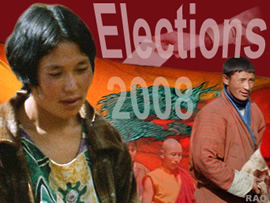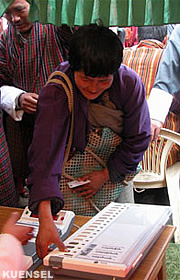 |
Bhutan Politics - Elections |
|
|
 |
|
Election
coverage regulations
|
 |
The
Election Commission of Bhutan is in the process of drawing up regulations
on election advertising and coverage by the media during the 2008 elections
to ensure free and fair elections, according to commission officials.
 |
| According
to commissioner C.D Rigdzin, The Media Coverage of Election Rules and Regulations
and the Election Advertising Regulations, which were briefly presented
during the two-day seminar on "Media and Democracy" last week, would prevent
all forms of media in Bhutan from favouring or promoting a political party.
"The
media is bound to give objective reporting, it should refrain from publishing
or broadcasting any material with potential of inciting hatred and communal
division," the commissioner said. |
|
The
regulations among other things, bars media from any coverage on election
campaigning 48 hours before polling or actual voting.
"The
media will have to be aware of certain rules during election because even
without an intention to support a party or a candidate, it will be seen
as indirectly supporting by covering the activity of a party on a crucial
period where it is not supposed to cover," he said. "Media is a powerful
instrument and it might give wrong signals or influence the voters. It
is the right of the voters to give their own independent reflection without
being influenced by media."
The
commissioner however, explained that the regulations did not mean that
there would be total news black out. The rules are being drawn based on
democratic principles practiced for centuries in other countries, he said.
The
Election Advertisement Regulations, according to the commissioner, would
try to regulate or control undue influence of money power in election.
 |
| "Advertisement
is linked to how a voter sees a party," he said. "A party or candidate
having so much resource can advertise and influence voters' decision."
Parties
or candidates would have to follow rules from sticking posters to hanging
banners to canvassing, and allocation of time and space in all forms of
media.
The
regulations would cover all forms of media including electronic media like
Internet, chat rooms, and short message service (SMS) with an objective
to solicit votes, share information to reach out and convince voters about
a party's manifestos, objectives, or its strength.
Even
those who conduct surrogate campaigning; campaigning on their own would
be covered. |
|
If
not controlled, some parties may try to exceed the government-approved
ceiling of campaign expenditure or use other means to campaign, the commissioner
said. "This legislation would curb this kind of maneuvering," he added.
The
commissioner explained that the advertisement regulation would create a
level playing field and ensure that parties with less resources are not
sidelined or discriminated.
Any
agency or media fraternity conducting public opinion polls should refrain
from releasing the results prior to the closure of the polls, according
to the draft regulation.
"Opinion
polls have huge impact and could lead to undesirable ramifications," said
the commissioner.
Asked
if editorial policy would be restricted, the commissioner said that any
media should not, under the guise of editorial coverage, cover programmes
of a party during the polls.
"Media
has all the right to use its discretion," said the commissioner. "The media
has the right to reject anything that is likely to promote public disorder
or threaten national security."
 |
| Contributed
by Ugyen Penjor, Kuensel, Bhutan's National Newspaper, November 2006 |
| Links |
 |
 |
 |
External
Links |
|




